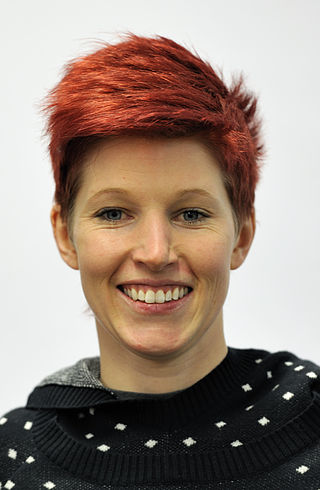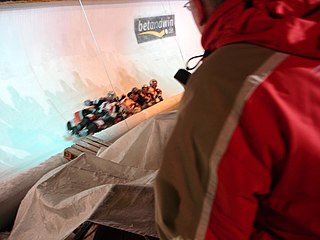Related Research Articles
Florian Grassl is a German skeleton racer who has competed since 2002. He won a silver medal in the men's skeleton event at the 2004 FIBT World Championships in Königssee.
Frank Kleber is a German skeleton racer who has competed since 2000. He won two medals at the FIBT World Championships with a gold in 2007 and a bronze in 2004.
Konstantin Aladashvili is a Russian bobsledder and skeleton racer who has competed since 1999. He finished 22nd in the men's skeleton event at the 2002 Winter Olympics in Salt Lake City. Aladashvili also competed at the FIBT World Championships, finishing 23rd in the men's skeleton event at Calgary, in 2005.
Martin Rettl is an Austrian skeleton racer who competed from 1989 to 2006. Competing in two Winter Olympics, he won a silver medal in the men's skeleton event at Salt Lake City in 2002.
Chris Soule is an American skeleton racer who competed from 1993 to 2006. He won two medals in the men's skeleton event at the FIBT World Championships with a silver in 2003 and a bronze in 1997. Soule also won the overall men's 2002–3 Skeleton World Cup title with multiple World Cup victories that season. He is the 3-time U.S. National Champion and remains one of the most decorated Skeleton athletes in the history of the sport.

Anja Huber is a German skeleton racer who has competed since 2003. She earned two gold medals at the 2008 FIBT World Championships in Altenberg, Germany, winning them in women's skeleton and the mixed bobsleigh-skeleton team event.
The IBSF World Championships, part of the International Bobsleigh and Skeleton Federation, have taken place on an annual basis since 1930. Starting with 2002, no World Championships being held in non-Winter Olympic years. A two-man event was included in 1931 with a combined championship occurring in 1947. Men's skeleton was introduced as a championship of its own in 1982 while women's bobsleigh and skeleton events were introduced in 2000. Both the women's bobsleigh and skeleton events were merged with the men's bobsleigh events at the 2004 championships. A mixed team event, consisting of one run each of men's skeleton, women's skeleton, 2-man bobsleigh, and 2-women bobsleigh, was held from 2007 to 2019. In 2020 it was replaced with skeleton mixed team event, consisting of one run each of men's and women's skeleton. Women's monobob event was included in 2021.
Alain Wicki is a Swiss skeleton racer who competed from the 1980s to the early first decade of the 21st century. He won a complete set of medals in the men's event at the FIBT World Championships with a gold in 1989, a silver in 1998, and a bronze in 1982.
Ryan Davenport is a Canadian skeleton racer who competed from 1993 to 1999. He won three medals in the men's skeleton event at the FIBT World Championships with two golds and one bronze (1995).
Lindsay Alcock is a Canadian skeleton racer who has competed since 1998. She won a silver medal in the women's skeleton event at the 2004 FIBT World Championships in Königssee.
Monique Riekewald is a German skeleton racer who has competed since 1997. She won a gold medal in the mixed bobsleigh-skeleton team event at the 2007 FIBT World Championships in St. Moritz.
Sebastian Haupt is a German skeleton racer who has competed since 2001. He won the gold medal in the mixed bobsleigh-skeleton team event at the 2008 FIBT World Championships held in Altenberg, Germany.
The FIBT World Championships 2009, officially known as the Bauhaus FIBT Bobsleigh & Skeleton World Championships, February 20 to March 1, 2009, at the bobsleigh, luge, and skeleton track in Lake Placid, New York, for the ninth time, doing so previously in 1949, 1961, 1969, 1973, 1978, 1983, 1997 (skeleton), and 2003. Lake Placid was chosen 25–11 over Igls, Austria.

The Olympic Sliding Centre Innsbruck is a venue for bobsleigh, luge and skeleton located in Igls, Austria. The most recent version of the track was completed in 1975 and is the first permanent, combination artificially refrigerated bobsleigh, luge, and skeleton track, serving as a model for other tracks of its kind worldwide. It hosted the bobsleigh, luge, and skeleton competitions for the 2012 Winter Youth Olympics.
The 2009–10 Skeleton World Cup was a multi race tournament over a season for skeleton. The season started on 12 November 2009 in Park City, Utah, United States, and ended on 24 January 2010 in Igls, Austria. The World Cup was organised by the FIBT who also run world cups and championships in bobsleigh.
The 2010–11 Skeleton World Cup was a multi race tournament over a season for bob skeleton. The season started on 25 November 2010 in Whistler, Canada, and ended on 4 February 2011 in Cesana, Italy. The World Cup was organised by the FIBT who also ran world cups and championships in bobsleigh. This season was sponsored by Viessmann.

Stephanie Schneider is a German bobsledder who has competed since 2008. Her best World Cup finish was first in the two-woman events at Whistler in November and Lake Placid in December 2010.
The 2011–12 Skeleton World Cup is a multi race tournament over a season for skeleton. The season started on 2 December 2011 in Igls, Austria and ended on 11 February 2012 in Calgary, Alberta, Canada. The World Cup is organised by the FIBT who also run World Cups and Championships in bobsleigh. This season is sponsored by Viessmann.

Arvis Vilkaste is a Latvian bobsledder, brakeman who has competed since 2010.
The European Bobsleigh and Skeleton Championships are the main bobsleigh and skeleton championships in Europe. The first bobsleigh European Championships with two-man event was held in 1929 in Davos, Switzerland. However, as Bobsleigh World Championships started to be held on an annual basis since following year, European Championships didn't resumed until 1965. A four-man event was included in 1967 when first combined championship occurred. The men's European Skeleton Championships were held separately in 1981–1988 before resuming in 2003 when women's skeleton event was added as well. In 2004 the first women's European Bobsleigh Championship was held with two-woman event. The following year both the women's bobsleigh and skeleton events were merged with the men's bobsleigh events at the European Championships. Since then, all bobsleigh and skeleton events are usually competes at the same time and venue. Women's monobob event was included in 2022.